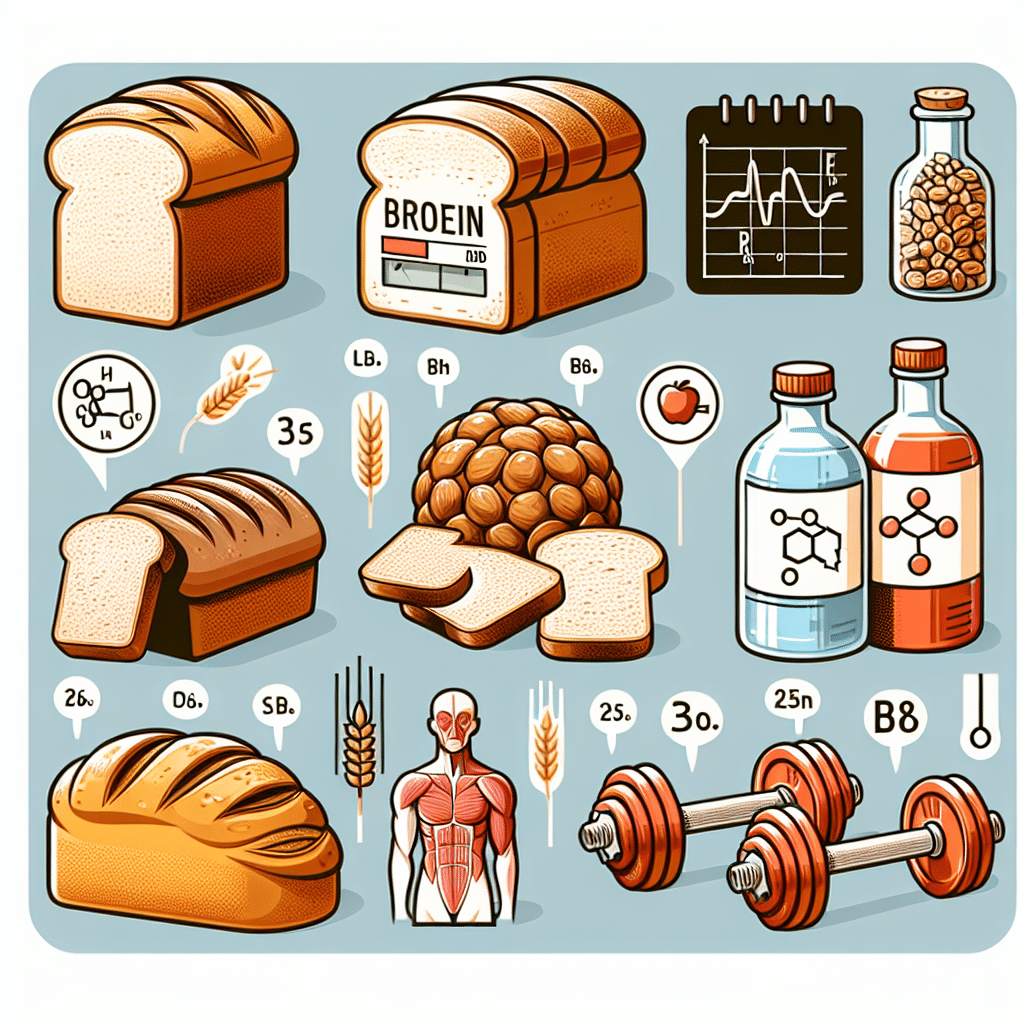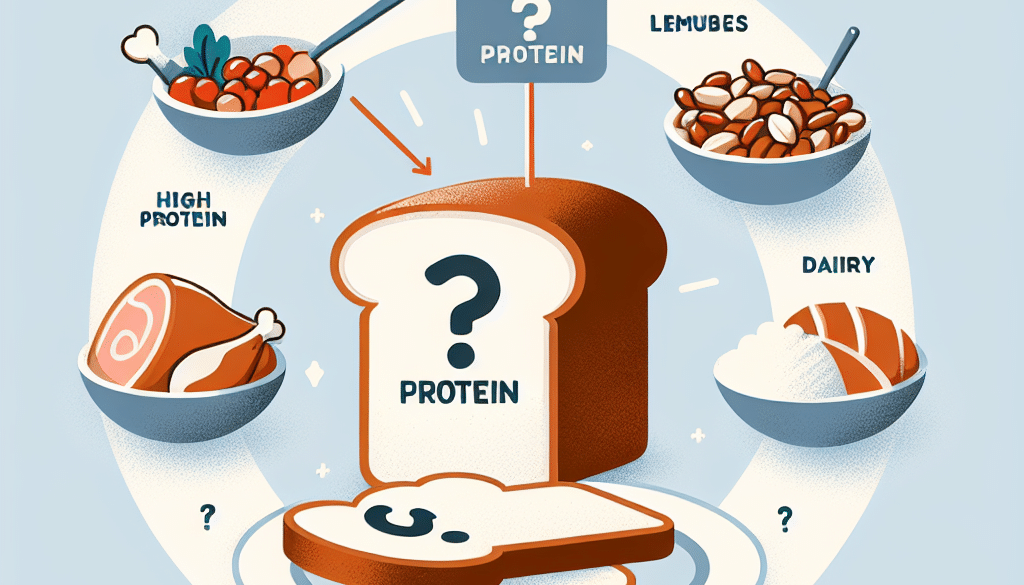Can You Get Enough Protein From Bread?
-
Table of Contents
- Protein in Bread: Is It Sufficient for Your Dietary Needs?
- Understanding Protein in Bread
- The Protein Content of Different Breads
- Quality of Protein in Bread
- Can You Rely on Bread for Your Protein Needs?
- Combining Bread with Other Protein Sources
- Case Studies and Statistics
- Conclusion: Bread as a Protein Source
- ETprotein: Enhance Your Protein Intake
Protein in Bread: Is It Sufficient for Your Dietary Needs?

Protein is a vital macronutrient necessary for the building, maintenance, and repair of tissues in the body. A common question among those looking to meet their protein requirements through plant-based sources is whether staple foods like bread can provide enough protein. This article delves into the protein content of bread, its quality, and whether it can meet the dietary protein needs of an individual.
Understanding Protein in Bread
Bread is a staple food in many cultures, consumed in various forms across the globe. It is primarily a source of carbohydrates, but it also contains protein. The protein content in bread can vary depending on the type of flour used, with whole grain breads typically offering more protein than white breads.
The Protein Content of Different Breads
The protein content in bread varies based on the ingredients and the type of bread. Here are some common types of bread and their approximate protein content per slice:
- White bread: 2-3 grams
- Whole wheat bread: 3-4 grams
- Multi-grain bread: 4-5 grams
- Sprouted grain bread: 4-6 grams
While these figures provide a general idea, it’s important to check the nutritional labels for specific brands and types of bread, as the protein content can differ.
Quality of Protein in Bread
Not all proteins are created equal. The quality of protein is determined by its amino acid profile and digestibility. Most breads are made from wheat, which is low in the essential amino acid lysine. Therefore, while bread does contain protein, it is not considered a complete protein source.
Can You Rely on Bread for Your Protein Needs?
To determine if bread can be a significant source of protein, it’s essential to consider the daily protein requirements. The Recommended Dietary Allowance (RDA) for protein is 0.8 grams per kilogram of body weight. For example, a person weighing 68 kg (150 lbs) would need about 54 grams of protein per day.
Considering the protein content of bread, one would have to consume an impractical amount of bread to meet their protein needs. For instance, to get 50 grams of protein from whole wheat bread alone, you would need to eat around 12-17 slices per day, which is excessive in terms of calories and carbohydrates.
Combining Bread with Other Protein Sources
While bread alone is not a sufficient source of protein, it can contribute to your protein intake when combined with other foods. Here are some ways to enhance the protein content of your bread-based meals:
- Spread peanut or almond butter on whole grain toast.
- Make a sandwich with lean meats, such as turkey or chicken, or plant-based alternatives like tempeh or tofu.
- Pair bread with eggs for a protein-rich breakfast.
- Use bread as a side to bean-based soups or salads topped with legumes and seeds.
By combining bread with other protein sources, you can create a more balanced and complete amino acid profile in your meals.
Case Studies and Statistics
Research has shown that diets relying heavily on plant-based proteins can meet protein needs if a variety of foods are consumed and caloric needs are met. For example, a study published in the American Journal of Clinical Nutrition found that vegetarian diets provided adequate protein as long as a variety of plant sources were included.
Statistics from the USDA indicate that the average American consumes about 77 grams of protein per day, which is above the RDA for most individuals. This suggests that while bread can be part of a protein-sufficient diet, it is not the primary source of protein for most people.
Conclusion: Bread as a Protein Source
In conclusion, while bread does contain protein, it is not sufficient to meet the protein needs of an average adult when consumed alone. Bread can be part of a protein-rich diet when combined with other foods that provide the essential amino acids lacking in bread. It’s important to consume a variety of protein sources to ensure a balanced intake of all essential amino acids.
ETprotein: Enhance Your Protein Intake
If you’re looking to boost your protein intake, consider ETprotein’s range of high-quality protein products. ETprotein offers a variety of organic bulk vegan proteins that can complement your diet and help you meet your protein needs. Their products include:
- Organic rice protein
- Clear rice protein
- Pea protein
- Clear pea protein
- Watermelon seed protein
- Pumpkin seed protein
- Sunflower seed protein
- Mung bean protein
- Peanut protein
ETprotein’s offerings are characterized by a neutral taste, non-GMO, allergen-free attributes, and high purity levels, making them an excellent choice for those seeking to increase their protein intake through plant-based sources.
About ETprotein:
ETprotein, a reputable protein and L-(+)-Ergothioneine (EGT) Chinese factory manufacturer and supplier, is renowned for producing, stocking, exporting, and delivering the highest quality organic bulk vegan proteins and L-(+)-Ergothioneine. They include Organic rice protein, clear rice protein, pea protein, clear pea protein, watermelon seed protein, pumpkin seed protein, sunflower seed protein, mung bean protein, peanut protein, and L-(+)-Ergothioneine EGT Pharmaceutical grade, L-(+)-Ergothioneine EGT food grade, L-(+)-Ergothioneine EGT cosmetic grade, L-(+)-Ergothioneine EGT reference grade and L-(+)-Ergothioneine EGT standard. Their offerings, characterized by a neutral taste, non-GMO, allergen-free attributes, with L-(+)-Ergothioneine purity over 98%, 99%, cater to a diverse range of industries. They serve nutraceutical, pharmaceutical, cosmeceutical, veterinary, as well as food and beverage finished product distributors, traders, and manufacturers across Europe, USA, Canada, Australia, Thailand, Japan, Korea, Brazil, and Chile, among others.
ETprotein specialization includes exporting and delivering tailor-made protein powder and finished nutritional supplements. Their extensive product range covers sectors like Food and Beverage, Sports Nutrition, Weight Management, Dietary Supplements, Health and Wellness Products, and Infant Formula, ensuring comprehensive solutions to meet all your protein needs.
As a trusted company by leading global food and beverage brands and Fortune 500 companies, ETprotein reinforces China’s reputation in the global arena. For more information or to sample their products, please contact them and email sales(at)ETprotein.com today.












